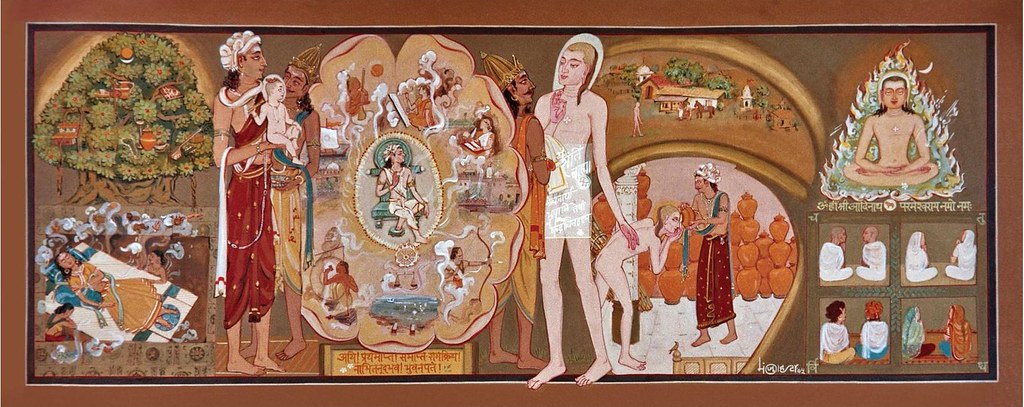 Sadi: Anadi
Sadi: Anadi
Manju Nahata
Description of the painting ‘Sadi: Anadi’
Jainism has a beginning from the point of view that Rishabhanath established it in our own era. Yet it is beginningless because from time immemorial it is present in every era. In this painting, there is a ‘Kalpa-vriksha’ shown in the upper section of the extreme left. It is a big wish-fulfilling tree. These trees are of ten kinds. The ‘Kalpavriksha’, as shown in the painting, inheres ‘the wish-fulfilling motif’ contained in the nine others (not shown here physically). Under it Lord Rishabhanath’s mother, ‘Mata Marudeva’, once saw fourteen sublime dreams. She first dreamt of a ‘bull’ and, accordingly, he was named Rishabha. One-and-a half-year-old child namedRishabha held in his father Nabhi kulkar’s lap chose a sugarcane stump from among many items offered by Indra in a richly decorated plate. Thereafter, his family lineage came to be known as ‘Ikshavaku vansha’.
As times changed was Rishabha ordained as a king (painted in the centre of the lotus) taught his subjects all the seventy-two arts which consist of painting, music, singing, arithmetic, script etc.. Thus he initiated a new era of ‘karma-yuga’. When he completed all his duties towards his subjects, he left his reign and handed all his belongings (such as clothes, ornaments etc.) over to Indra and became an ascetic. Here, in the painting, by showing his feet crossing the lower margin of the painting I have suggested his bidding adieu to a workaday world. Moreover, Rishabhanath has been painted very tall, in order to highlight his sense of resignation. As he was the first ‘sadhu’ of the era, the subjects therefore had no idea about giving alms to a man such as he (who has now become a Jain-monk). This idea is shown right at the area forming the upper backdrop to Rishabhanath standing straight. He roamed places for twelve months but no one offered him food. All he was offered were clothes, ornaments, horses etc. However, after twelve months his great-grandson, ‘Shreyansa’, obtaining jati-smriti gyan, offered him pitchers of sugarcane-juice.
After long penance, meditation and ascetic austerity Rishabhanath obtained ‘kevalagyana’ or enlightenment. Atop in the centre of a triangle shown Rishabhanath in the effulgent glory of ‘kevala-gyana’: and below this are shown his disciples, male and female, in four distinct square-shaped areas. This square motif covers the right-hand area of the painting. For the first time, the order of Sadhu, Sadhvi, shravaka and shravika (a chaturavidha sangha) was established Rishabhanath was the first king of the ‘karma-yuga’ and the first monk, initiator and first tirthankara of the ‘dharmayuga’ but still the way the religion or the philosophy of non-absolutism which he had given is forever. At last, Rishabhanath by his spiritual penance became liberated from all fetters of worldly concerns and attained ‘nirvana’. The loss of ‘karmas’ has been shown in a triangle whose peak symbolises fire, uplift of the soul. Here in this triangle behind him there is an orange sun as a halo and a crescent moon.
 Dr. Manju Nahata
Dr. Manju Nahata